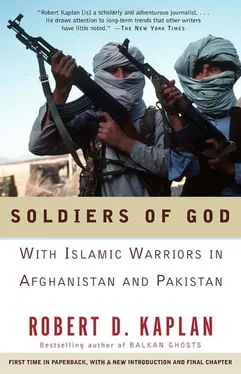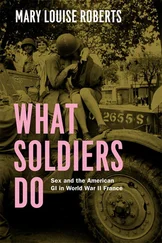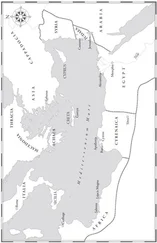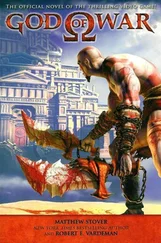Next I visited the Sunnis. I drove through another succession of katchiabaadis to a bleak industrial zone, where I left the car and banged at an iron gate. Inside was a complex of school buildings with armed security guards. One of the guards led me to a room with a wall-to-wall carpet that had just been vacuumed. People sat on the floor with cushions behind them, in the traditional Oriental fashion. All had beards, skullcaps, and spotless white robes. The low glass coffee tables had just been polished. After the filth of so much of Karachi, I couldn’t help being impressed.
I noticed security cameras mounted over all the doors. After removing my shoes, I was brought an ice-cold Pepsi. Then I was ushered into another spotless room, also with a vacuumed rug. Behind a low glass desk in a corner I saw three closed-circuit television screens, a speakerphone, headphones, a VCR, and a computer. A tiny, pudgy man with a gray beard and fashionable glasses, wearing a skullcap and a white shalwar kameez, entered the room.
“Will you excuse me while I say my prayers?” he asked. I waited as he knelt on the floor and prayed. Then he sat down behind the desk, turned on the television screens, put on the headphones, and proceeded to observe two classes in progress, giving orders to the teachers over the speakerphone while monitoring the entrance on a third screen. Speaking in a finely enunciated blend of Urdu and Arabic, he seemed both meticulous and relentless.
Mufti Mohammed Naeem is the rector of thejamia Binoria, a “society” of Islamic madrassas linked to the extreme Wahabi and Deobandi traditions. (Masood Azhar, a militant whom India jailed for fanning Islamic separatism in Kashmir and was forced to release after an airline hijacking last December, studied in one of these academies.) Mufti Naeem rattled off statistics for me: thejamia Binoria has 2,300 students, ages eight through twenty, from thirty countries, including the United States. The twelve-acre campus includes a hotel and a supermarket. Separate accommodations and cafeterias are provided for boys and girls. “The girls arrive from abroad with skirts, but now they are fully covered,” he said breezily. “We have changed their minds.” He explained that although the foreign students paid tuition, the poor of the katchiabaadis were educated without charge. Yes, he had a Web site. As he spoke, he fielded calls and kept checking the television monitors.
“What do you teach?” I asked.
“Islam, not math or anything else, only Islam.” Mufti Naeem called in a number of foreign students. One, a teenage American boy from Los Angeles, explained, “We only study those sciences… such as grammar, Arabic linguistics, and jurisprudence…that help us understand Islam.” When I asked the students what they planned to do when they returned home, they all said, “Propagate Islam.” Some of the Americans came from Muslim backgrounds; others were Christians who had converted. The Americans agreed that the United States was a land of decadence and materialism for which only the prophet Mohammed had the answer.
The most significant aspect of the madrassa was the service it provided for the poor. Here was the one school in Karachi, a local analyst told me, where the children of the katchiabaadis were fed, educated, protected, and even loved. Mufti Naeem said, “The state is bathed in corruption. The teachers at the government schools are unqualified. They get their jobs through political connections. We, not the government, are educating the common people. And we are putting all our efforts into training those who will spread Islam.”
According to the Human Rights Commission of Pakistan, many of the country’s public schools are “ghost schools” that exist only on paper. If there was one thing the military regime could accomplish, I thought, it would be to force parents, particularly in the backward tribal areas, to send their children, boys and girls, to school, and to make the schools decent. But General Musharraf is not doing that. Nor is he being pressured by the West to do it, even as the West spends its political capital here demanding a return to the same parliamentary system that bankrupted the country and resulted in the military coup. Given that the Subcontinent is a nuclear battleground where defense budgets are skyrocketing, and at the same time it is home to 45 percent of the world’s illiterate people, I can see few priorities for the United States higher than pressuring governments in the region to improve primary education. Otherwise the madrassas will do it. What was so frightening about Mufti Naeem was the way he used Western information-age paraphernalia in the service of pan-Islamic absolutism.
Pakistan has never been well governed. After the military fought its catastrophic war with India in 1971, hopes were placed on the new democratic leader, Zulfikar Ali Bhutto, a wealthy landlord from Sind. But Bhutto turned out to be a divisive populist who sowed fear with his security service and surrounded himself with sycophants. His 1977 re-election was marred by fraud; riots broke out and Bhutto declared martial law. Soldiers fired on people in the streets. The military wasn’t happy; the army chief of staff, Zia ul-Haq, led a coup.
It was Zia who released the fundamentalist genie: though moderate himself, he allied the military with Sunni radicals in order to win support for his new regime. After his death, in 1988 in an air crash that has yet to be explained, democracy returned with the election of Bhutto’s daughter, Benazir, as Prime Minister. Though educated at Harvard, Benazir had no political or administrative experience and had made what by all accounts was a disastrous marriage to Asif Ali Zardari, who later became her Investment Minister. Zardari’s large-scale theft of public funds undermined his wife’s government. Elections next brought the Punjabi businessman Nawaz Sharif to power. Together with his brother, Shabaz, Sharif ran Pakistan as a family enterprise; the brothers’ reputation for taking huge kickbacks and other financial malfeasance outdid even that of Benazir’s cabinet. By his second term, reportedly, Sharif was amassing so much money that it was feared that he could perpetually buy off the members of the National Assembly and create a virtual dictatorship. The Sharif and Bhutto governments stand accused of stealing $2 billion in public money, part of some $30 billion smuggled out of the country during democratic rule.
When, in October 1999, General Musharraf toppled Sharif’s government in a bloodless coup, the West saw it as a turn for the worse. However, Pakistanis saw the accession of General Musharraf as a rare positive development in a country where almost all trends are bad. The local media are (at least for now) freer under the military than they were under Sharif, whose aides frequently intimidated journalists. Musharraf has initiated no extensive personality cult. He has said more to promote human rights than have the officials of recent democratic governments, working to end such abhorrent tribal and religious practices as “honor killings” and “blasphemy laws” (though radical clerics have forced him to back down on these issues). Mehnaz Akbar, of the private Asia Foundation, in Islamabad, says, “This is the most liberal time ever in Pakistan.” Musharraf, an admirer of Mustafa Kemal Atatürk, the founder of the Turkish Republic, is a like-minded modernizer. He shakes hands with women in full public view, and one of the first pictures taken of him after he assumed power shows him holding his two poodles, even though dogs are considered unclean by traditional Muslims. Most important, as one Pakistani journalist told me, “Musharraf speaks with conviction and people believe him, whereas Benazir, though an intellectual, was never believed.”
Читать дальше












